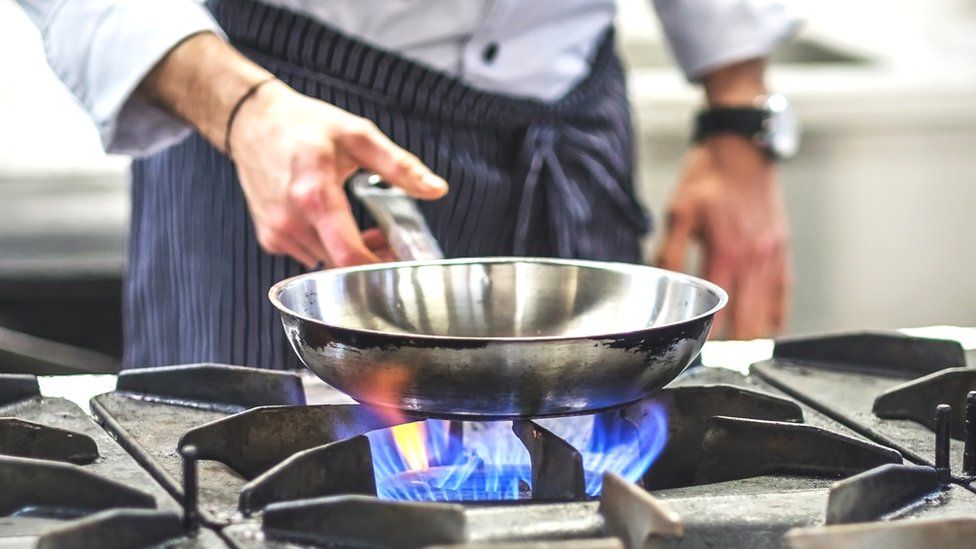Gas price rises prompt urgent government talks
- Published

The government is holding urgent talks with representatives from the energy industry amid growing concern about a spike in wholesale gas prices.
Business Secretary Kwasi Kwarteng is talking to suppliers to hear how wide-reaching the impact of surging prices could be on companies and households.
High global demand, maintenance issues at some gas sites and lower solar and wind output are blamed for the rise.
The high prices have already led two large fertiliser plants to close.
This has resulted in a cut in the supply of carbon dioxide (CO2) - a by-product of fertiliser production - to the food industry and other manufacturers.
Government sources have said there is no threat to gas supplies and the impacts on small energy companies that might be the most exposed are being monitored.
But the BBC has been told that officials are looking at whether products that could end up being in short supply, such as fertiliser, could be imported from abroad.
Meanwhile, the British Soft Drinks Association said some producers are facing a shortage but have plans in place to help maintain their businesses.
'Absolute priority'
Natural gas prices are at record highs as economies around the world begin to recover from the Covid crisis.
In the UK, lower winds have meant less renewable energy is generated. There have also been outages at some nuclear stations and lower flows into the UK of natural gas from Norway, pushing up the price of natural gas.
Industry group Oil & Gas UK said wholesale prices for gas are up 250% since January - with a 70% rise since August.
The Department for Business, Energy and Industrial Strategy (BEIS) reported that in 2020, 60% of the UK's natural gas supply was imported.
Mr Kwarteng is talking to chief executives from gas producers, the National Grid, suppliers including Scottish Power, EON and EDF, and the regulator Ofgem.
The business secretary said energy security was "an absolute priority".
The Department for Business, Energy & Industrial Strategy said on its website: "While we are not complacent, we do not expect supply emergencies this winter."
Dermot Nolan, director at Fingleton Strategic Consultancy and former chief executive of Ofgem, told the BBC gas prices have increased not just in Britain but all over the world, with "Germany and Spain experiencing similar types of increases".
He said "high gas and high electricity prices will be sustained for the next three to four months", adding that it was difficult to see what the government could do about it.
Shadow business secretary Ed Miliband said the government must "ensure security of supply and take the long-term action to put in place a much more robust, resilient and diverse energy infrastructure".
He said: "It is a fundamental failure of long-term government planning over the last decade that we are so exposed and vulnerable as a country and it is businesses and consumers that are paying the price."
UK consumers are already facing a big hike in bills this winter as higher wholesale prices have led to a recalculation of the energy price cap, but perhaps the more immediate threat is a shortage of carbon dioxide used in the food industry.
The energy-intensive fertiliser industry has seen two huge plants in Teesside closed down as the gas price has made them uneconomic - which has caused knock-on shortages of CO2 - a by-product of fertilisation production.
CO2 is used to stun animals before slaughter, as a coolant agent in transport and as a shelf life extending agent in food packaging.
Nick Allen from the British Meat Processors Association described it as a 'black swan event' - meaning a rare but potentially destructive set of circumstances.
He said supply already stretched from shortages of labour in abattoirs and shortages of HGV drivers may break with this additional stress.
Meanwhile, Richard Griffiths, CEO of the British Poultry Council, has said the current situation felt more serious than previous CO2 shortages and that ministers would need to act quickly to ensure the government delivers on its promise to 'save Christmas'.
Meat processors are also in talks with the government over shortages of carbon dioxide because of its use in meat production. The government source said CO2 supplies for nuclear power and hospitals would be prioritised.
Andrew Opie, director of food and sustainability at the British Retail Consortium, said this "could not come at a worse time".
He wants government to work with industry to find a solution quickly so problems "don't escalate further".
The government pointed out that the energy price cap will limit the impact on household bills, although that cap is due to rise next month.
A spokesperson said: "The UK benefits from having access to highly diverse sources of gas supply to ensure households, businesses and heavy industry get the energy they need at a fair price.
"We are monitoring this situation closely and are in regular contact with the food and farming organisations and industry, to help them manage the current situation."
Additional reporting by Alex Therrien.
- FROM BLOODBATHS TO THE PUB: What's it like mopping up after a crime scene?
- FROM WITCHES TO WARRIORS: Series 2 of Fort Salem streaming now on BBC iPlayer
- Published9 September 2021
- Published17 September 2021